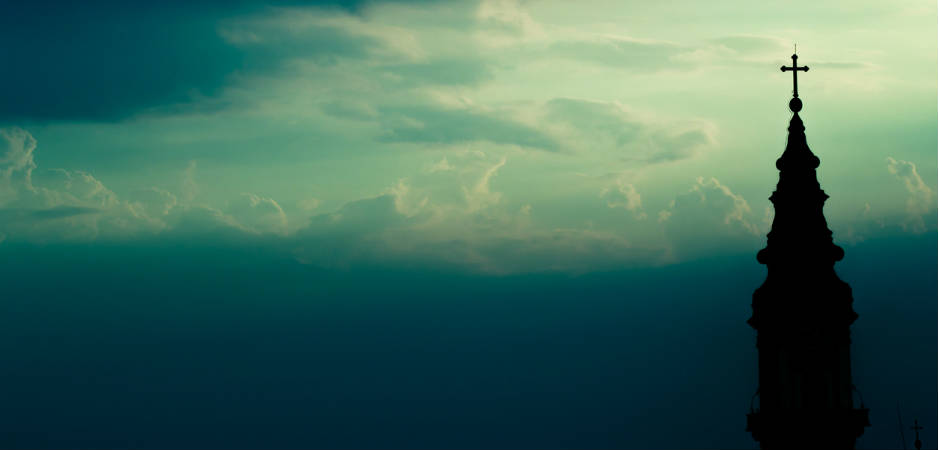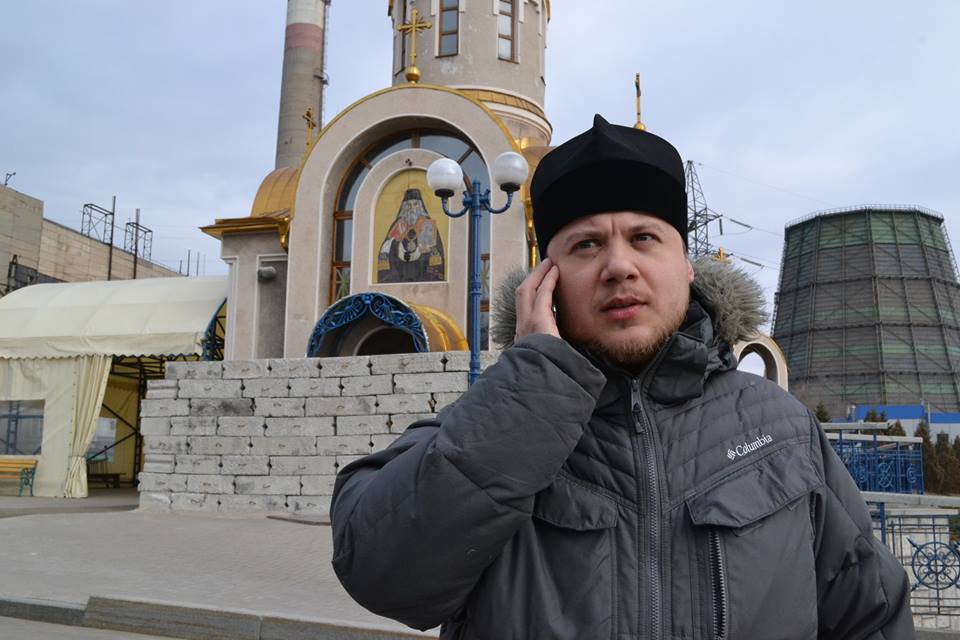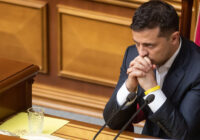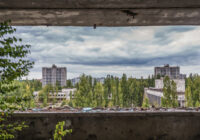In Eastern Ukraine, the Orthodox Church finds itself in the crossfire of an ideological conflict.
“I call on those who cry out that we should restore justice with our fists: Our country is ailing, but we must treat her in a way that does not kill the patient … We must call a sin a sin, but love the sinner. I speak of the eternal. Think of that, so that you won’t be ashamed to look in the eyes of your children, so that you won’t need to stand before the icon and cry ‘Lord, what have we done?’”
The Orthodox priest Giorgiy Gulyaev spoke these words on March 1, 2014, to a large, restive crowd in the Eastern Ukrainian city of Donetsk. He was addressing a meeting attended by both sides of the rapidly polarizing city and directed his words to the pro-Russian separatists in the crowd, who comprised the majority. They roared their disapproval at him, and not long after his speech a crowd of separatists led by the new “people’s mayor” swept Father Giorgiy and their opponents from the square and seized the city administration. The Ukrainian yellow and blue was torn down and the Russian tricolor raised in its place. Ukraine had lost Donetsk. But he had done what he could.
Father Giorgiy’s words were those of a Ukrainian agonized equally by his country’s “ailment”—the divisive Euromaidan revolution in Kiev that brought a pro-Western government to power and alienated millions in the country’s east, and by the “treatment” being stoked by Russia—armed separatism.
Throughout the war in the Donbass Father Giorgiy attempted to hold his ground as faultlines open beneath him. He is a sincere Ukrainian patriot who passionately serves in the Ukrainian Orthodox Church of the Moscow Patriarchate (UOC-MP), considered by many to be Russia’s cultural beachhead in the country. From his chapel in the Donetsk Metal Works he condemned both incoming and outgoing artillery strikes. He criticized radical Ukrainian nationalists who seized “Muscovite” churches and also separatists who paraded Ukrainian POWs through the streets of Donetsk.
In so many ways the center that Father Giorgiy occupied could not hold. But he shows how an ethical man can navigate seemingly intractable conflicts. One is being waged with artillery by the Russian-backed separatists and the Ukrainian Army in the rusting industrial cities of the Donbass, with horrific human consequences: almost 10,000 dead according to the UN—2,000 civilian, at a very conservative estimate—and as many as 1.7 million people displaced within Ukraine at the peak of the conflict and perhaps a million to Russia and other countries The other conflict is within Ukrainian Orthodoxy and involves questions of loyalty, patriotism and religious liberty.
Only God to Hope For
Before the war, Father Giorgiy was both priest and press secretary for the Ukrainian Orthodox Church in Donetsk. The Moscow Patriarchate (MP) is recognized by the Orthodox world and warily shares Ukraine with its rival, the unrecognized but increasingly popular Ukrainian Orthodox Church of the Kyivan Patriarchate (UOC-KP). The former dominates the country’s east and the latter its center and west. Long before the war relations were strained, with the patriarchates trading charges of “schismatics” and “Moscow agents.” But Father Giorgiy could complacently enjoy the MP’s majority status in Donetsk, while demonstrating an unusual openness to other confessions and secular journalists.
Father Giorgiy watched the Euromaidan revolution in in the winter of 2013-14 with alarm. Support for the revolutionary movement in the eastern Donetsk and Luhansk regions of the Donbass was minimal—around 17%—but Donetsk did have its own Maidan peopled by many liberal journalists Gulyaev had befriended. The revolution’s victory in February was rapidly followed by Russia’s annexation of Crimea and its subversive Russian Spring project, which fostered separatism in the Donbass.
Many Ukrainians accuse the Moscow Patriarchate of welcoming the Russian Spring and offering aid and comfort to separatists and their Russian accomplices. Father Giorgiy bridles at the accusation, claiming that MP leadership did everything they could to support the legal authorities in Donetsk, whose paralysis helped hand the city over to the separatists.
His own actions at the pro-unity rally in March 2015 demonstrate courage in the face of the armed takeover, but such gestures were not enough. Thousands of pro-unity residents fled after the city was christened capital of a separatist Donetsk People’s Republic (DPR). But Father Giorgiy continued to serve at his chapel, crossing the emptying city every day under artillery fire. The church became a haven from the nerve-shattering strain and ideological radicalization of wartime Donetsk. After the factory was shelled and several workers killed, he shielded the church’s entrance with stacked cement barriers.
“We learned to pray through the sound of artillery fire and ask each other for forgiveness at every service, hoping that we would meet again the next week,” he recalled in 2014. Knowing that his congregation included both fervent separatists and quiet supporters of Ukrainian unity, Gulyaev fostered a distance from the world that allowed them to pray together in harmony. He notes with pride that not a single of his congregants took up arms in the Donbass conflict.
In regular Facebook posts and interviews for the Ukrainian and Russian press Gulyaev offered a glimpse into the war-wracked city and a compassionate, consistent denunciation of the conflict’s brutality. “I remember the shock and crash of the outgoing artillery when the DPR began firing on the Ukrainian forces,” he told me in October. “We curled up on the floor and prayed. ‘God have mercy on us, God have mercy on us …’ There was no one else to hope for.”
The DPR artillery incited answering fire from the Ukrainian army. But as the destructive shelling by Ukrainian forces dragged on for months, Father Giorgiy came to see it as “senseless … incomprehensible” and a crucial factor in driving Donetsk residents away from Ukraine. “When we buried those people [killed in artillery strikes] it was difficult to understand, to explain why they died,” he said in a 2015 interview. “My congregants felt that they were being fired on by their own people. And through all of it they considered themselves a part of Ukraine.”
He recalls delivering emergency fuel to a psychiatric hospital in Donetsk in the winter of 2014-15, when the two sides pounded each other incessantly with heavy artillery. No DPR positions were nearby, but the hospital’s grounds were cratered and its windows blown out. “Only by the grace of God was the hospital itself not hit.”
But many churches were. The Iversky Monastary was destroyed when the nearby Donetsk airport became one of the war’s key battlegrounds. Artillery shells burned a new wooden church to the ground in separatist-controlled Horlivka. Dozens of churches would be damaged in the province of Donetsk, the majority in the territories under separatist control. Father Giorgiy was conflicted about informing his congregation of new damages to churches for fear it would inspire some to call for revenge.
Today Donetsk Has Died
Such conditions drove Gulyaev to castigate the revolutionary government in Kiev for de-humanizing the residents of Donetsk. He wrote on Facebook: “The solution to the Donbass’ problems is not to fence it off with barbed wire, ‘cleanse’ and ‘disinfect’ it. You say you want to build a new Ukraine? It is not enough to tear down monuments to totalitarian rulers, first you must topple your mental idol, which still demands bloody sacrifice. The virus of hatred toward dissent is more dangerous than the dissent itself.”
Such jeremiads made some Ukrainians look on Father Giorgiy as a “secret separatist.” But his coldness toward the DPR authorities earned him enemies there as well, especially after he publicly opposed a decision to parade Ukrainian prisoners of war through the streets. “When the first images from that parade appeared online,” he recalls, “I just sat in my empty office in front of my monitor and cried.”
Then he wrote with concise rage on Facebook: “Today Donetsk has died.” This harsh judgement would be thrown back at him many times by the Russian and DPR press, which began labelling him a “hidden schismatic” and a “Ukrainian fascist.”
“People from both sides require of me that I share their emotions, judge who they judge and curse who they curse. They want to hold me to their preferred, inflexible position,” Gulyaev told Orthodox Life. “But it is not my task to simply ‘satisfy their religious needs.’ It is my task to witness for the One who gave us the Gospel. [In doing so] I feel that I cannot satisfy either side.”
In October 2015, at the urging of his own parishioners, Father Giorgiy finally left Donetsk to join his wife and children on Ukrainian-controlled territory. Divided now by the front line, Gulyaev and his Donetsk congregants try to keep alive the politically neutral, devotional space he created in his church. Most who stayed are now supporters of the unrecognized DPR, but consult by telephone with pro-unity Gulyaev on matters of faith. But he knows the bonds are fraying.
“Time is working against Ukraine,” he told me in an October Skype interview. Donetsk residents grow accustomed to the separatist authorities, saturated as they are in the Russian and DPR media spheres. And living through the shelling of Donetsk plays its role as well, requiring no spin.
Father Giorgiy insists that the Moscow Patriarchate is “the structure which can spiritually bind the Donbass to Ukraine.” He claims that the UOC-MP has resisted efforts by the DPR to turn it into a state church. “It remains the Ukrainian Orthodox Church, in name and practice,” he says. The boundaries of the dioceses have not adapted to the war, with the largest in the Donbass encompassing both Donetsk and Ukrainian-controlled Mariupol. Deeply divided as they are by ideology and geopolitics, he believes that Ukrainians must make their common faith a space for dialogue and reconciliation.
A Bridge or a Faultline?
But many Ukrainians vigorously disagree with Father Giorgiy’s characterization of the UOC-MP as a bridge to Ukraine. There is convincing evidence that certain Moscow Patriarchate priests and lay activists took part in the separatist movement from its earliest days, giving sanctuary to armed Russian mercenaries. MP priests blessed camouflaged separatists at their roadblocks and addressed their congregants at DPR rallies, while members of other religious affiliations faced violent repression and abduction. At least four Protestants were murdered in the earliest days of the war for their “alien faith.”
Some figures from the Moscow Patriarchate have joined in the construction of the Donetsk/Luhansk People’s Republics (LPR) state ideology on the basis of “traditional values” and brotherhood with Russia. Ukraine press and social media are full of anecdotal reports that MP priests in government-controlled areas of the Donbass praise the separatist fighters as a bulwark against Western cultural imperialism.
When I asked about separatism in his church, Father Giorgiy offered a cautious criticism: “… in the Orthodox Church we have one minus—our tendency to orient on the official local authorities. When a new [leader] arrives, we assess him for a while, and if he seems to act on some sort of legal basis then we form a relationship with him … We are very tied to the land …We must stay and protect our sacred relics.”
But Gulyaev posits that separatist priests are rogues and do not reflect the policy of their church. Kiev-based religious scholar Yuriy Chernomorets agrees, claiming that the only consistent predictor that a priest would support the DPR is whether he is a veteran of the Soviet Army. Many MP priests, including their leader Patriarch Onufrii, are sympathetic to the anti-modern Russian world ideology but do not condone its military-political manifestation in the People’s Republics.
Both patriarchates are more or less at peace in the war-torn Donbass, where they both have churches on the “wrong” side of the frontlines. In the Luhansk region, the KP bishop in Ukrainian-held territory protects MP churches from hostile takeovers by radical nationalists because he knows that the MP bishop in separatist-held Luhansk will do the same for KP churches.
But those sympathies are enough to convince many believers to vote with their feet. Since the start of the war polls indicate that more Ukrainians associate themselves with the Kyiv than the Moscow Patriarchate (44% and 21% of all believing Ukrainians, respectively), though this may not reflect actual numbers of churchgoers. Only in the Donbass does the Moscow Patriarchate remain the most common religious affiliation.
But, troublingly, the momentum against the Moscow Patriarchate goes beyond the voluntary choice of Orthodox faithful. MP parishioners in Western Ukraine claim that Kyiv Patriarchate (KP) activists and radical nationalists have attempted “hostile takeovers” of 31 churches, sometimes with the support of local police. Representatives of the Kyiv Patriarchate claim that this is a peaceful assertion of majority rights, but reports of kerchiefed babushkas being beaten up by camouflaged nationalists indicate a dark tendency toward violent coercion.
The Moscow Patriarchate has successfully countered hostile takeovers in Ukraine’s courts, but has received little sympathy from the government. In fact, a draft bill is before Ukrainian parliament that would simplify transfer of churches from one confession to another. If the law is passed anyone who self-identifies as a churchgoer can vote about its future affiliation, raising fears that true parishioners could be outvoted by cooked-up majorities. Besides the Moscow Patriarchate, Ukraine’s Jewish, Roman Catholic and Lutheran communities have spoken out against the bill as a threat to religious liberty.
Nor have public figures denounced the violent language sometimes directed at the Moscow Patriarchate by KP leaders, such as the Metropolitan of Rivne who said that “We will bury those who look to the north [Russia] … Do not let those who pray in the occupier’s tongue deceive you! God hears us, but he will never hear them.” Arson attacks on churches have become sadly frequent in Ukraine, mostly, but not exclusively, against the MP. Within a few days of this article being written, both a KP and a MP church were torched in Eastern Ukraine.
Fostering Unity
The Moscow Patriarchate cannot fulfil its stated goal of fostering unity and reconciliation until it addresses the breadth of separatist sympathy within the church. But the MP’s most virulent opponents risk widening a sectarian faultline that is spreading deep into Ukraine.
Interestingly, both patriarchates are more or less at peace in the war-torn Donbass, where they both have churches on the “wrong” side of the frontlines. In the Luhansk region, the KP bishop in Ukrainian-held territory protects MP churches from hostile takeovers by radical nationalists because he knows that the MP bishop in separatist-held Luhansk will do the same for KP churches, which the republican authorities have eyed for conversion.
Father Giorgiy also offers a personal example. Not only did he decline the many feelers from separatist leaders about making the MP the state church of the DPR. When he finally visited them in the paneled offices they seized from the Ukrainian security services it was to plead for the release of KP and Uniate priests held in basement prisons under suspicion of espionage. Strenuous theological and political differences did not stop him from risking his own freedom to secure that of other Ukrainian citizens and men of God.
One might wish that, like Gulyaev, the churches were united by love and Orthodox values, and not mutual fear and self-interest. But their commitment to maintain religious freedom on both sides of the frontline is nonetheless encouraging. Perhaps it offers a model for Ukraine as a whole: practical reconciliation can begin from shared suffering. The love can come later.
The views expressed in this article are the author’s own and do not necessarily reflect Fair Observer’s editorial policy.
Photo Credit: SKunevski
Support Fair Observer
We rely on your support for our independence, diversity and quality.
For more than 10 years, Fair Observer has been free, fair and independent. No billionaire owns us, no advertisers control us. We are a reader-supported nonprofit. Unlike many other publications, we keep our content free for readers regardless of where they live or whether they can afford to pay. We have no paywalls and no ads.
In the post-truth era of fake news, echo chambers and filter bubbles, we publish a plurality of perspectives from around the world. Anyone can publish with us, but everyone goes through a rigorous editorial process. So, you get fact-checked, well-reasoned content instead of noise.
We publish 2,500+ voices from 90+ countries. We also conduct education and training programs
on subjects ranging from digital media and journalism to writing and critical thinking. This
doesn’t come cheap. Servers, editors, trainers and web developers cost
money.
Please consider supporting us on a regular basis as a recurring donor or a
sustaining member.
Will you support FO’s journalism?
We rely on your support for our independence, diversity and quality.








